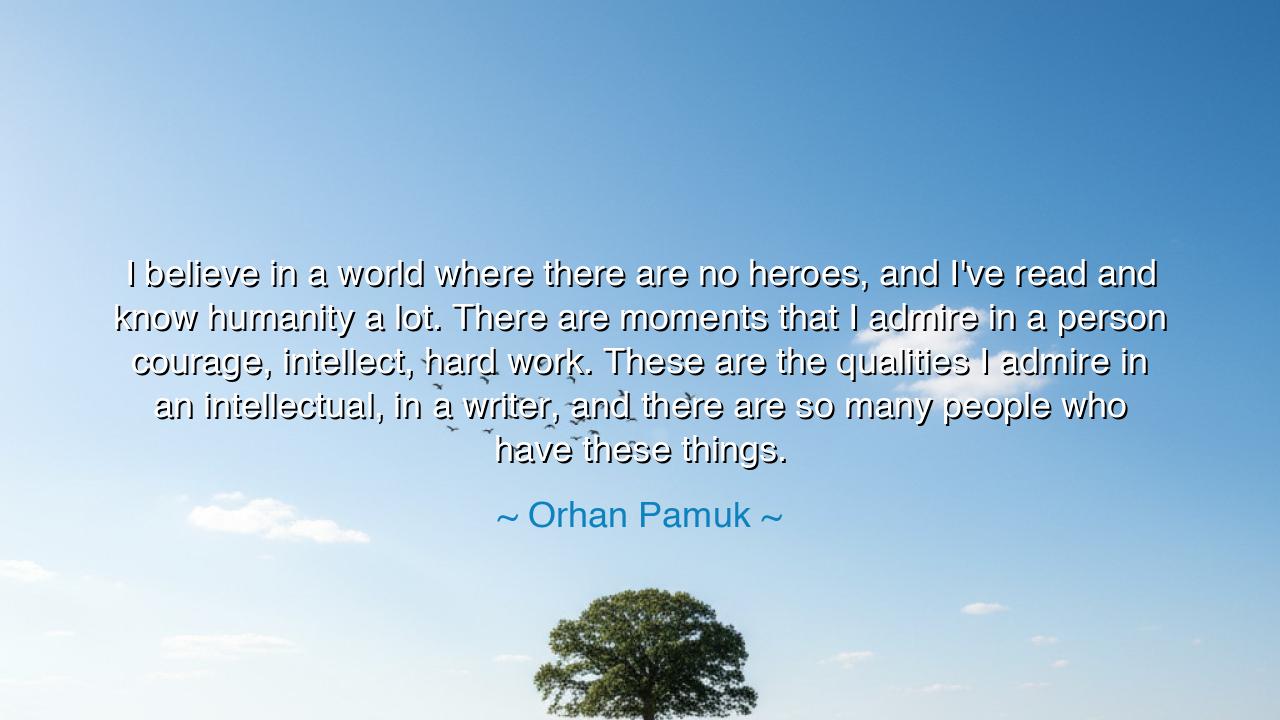
I believe in a world where there are no heroes, and I've read and
I believe in a world where there are no heroes, and I've read and know humanity a lot. There are moments that I admire in a person courage, intellect, hard work. These are the qualities I admire in an intellectual, in a writer, and there are so many people who have these things.






The Nobel laureate Orhan Pamuk, a man whose words flow like rivers through the human soul, once said: “I believe in a world where there are no heroes, and I've read and know humanity a lot. There are moments that I admire in a person courage, intellect, hard work. These are the qualities I admire in an intellectual, in a writer, and there are so many people who have these things.” In this confession, he does not speak with cynicism, but with deep humility. He calls us to lay aside the myth of heroes—those flawless beings we imagine standing above the rest—and instead to honor the quiet greatness found in the ordinary hearts of men and women. For Pamuk sees what many forget: that the divine spark of courage, intellect, and hard work lives not in the few, but in the many.
The meaning of his words is not to deny greatness, but to redefine it. In every age, humanity has built altars to heroes—warriors, kings, prophets, and poets—believing that salvation comes only through those who rise above the crowd. But Pamuk, who has studied the depths of human nature through history and story, reminds us that true strength is shared by all who dare to live with sincerity. He has seen too much of the world to believe in spotless heroes; he has seen the frailty behind greatness, the shadows behind glory. And yet, rather than despair, he finds hope—hope in the countless small acts of courage, the unseen labor of the mind and the heart.
This vision arises from Pamuk’s lifelong contemplation of humanity’s contradictions. In his novels, especially My Name is Red and Snow, he explores the tension between idealism and reality, between the heroic and the human. From these reflections comes his creed: that the myth of the hero often blinds us to the beauty of the imperfect. When we imagine that only heroes shape the world, we forget the quiet builders, the thinkers, the teachers, the artisans—the ordinary souls whose daily perseverance sustains civilization itself. Thus, Pamuk’s “world without heroes” is not barren—it is overflowing with human dignity, where each person’s effort has value.
To understand his wisdom, let us recall the story of Anton Chekhov, the Russian writer and physician. Chekhov lived without fanfare, healing the sick by day and writing by night. He shunned the image of the heroic artist, choosing instead to portray people as they were—flawed, yearning, and tender. When plague struck, he went among the infected, caring for them with quiet courage. He was no saint, no conqueror, no hero carved in marble—but his compassion and work endure longer than the monuments of kings. In Chekhov’s life, as in Pamuk’s words, we see that the heroic lies not in grand gestures, but in steadfast humanity.
Pamuk’s reflection is also a warning to the modern world, where the hunger for idols blinds the eye of discernment. We worship fame, success, and spectacle, calling them greatness. But he teaches that intellect, courage, and hard work—though they rarely glitter—are the true foundations of progress. The scientist who toils unseen in a lab, the writer who wrestles with truth through words, the mother who endures with love and patience—these are the unseen architects of the future. They may never be sung as heroes, yet their labor holds the world together.
There is also profound humility in Pamuk’s words. By rejecting the myth of the hero, he affirms that every soul is both light and shadow. We must not divide the world into gods and mortals, but recognize the shared struggle of all. Each person, in their moments of courage or kindness, reveals the heroic essence of humanity itself. To believe in “a world without heroes” is to believe in the equality of all striving hearts, where greatness is no longer the privilege of the few, but the calling of the many.
And so, the lesson for those who listen is this: seek not to be a hero, but to be authentic. Do not chase after the illusions of grandeur; instead, nurture the simple virtues that endure. Be courageous in your convictions, intelligent in your reflection, steadfast in your work. Admire those who live these truths, not those who dazzle with fame. For the world does not need more heroes—it needs more honest souls who labor with love and integrity, without expectation of reward.
Let your life, then, be a quiet testimony to this truth. Do not wait for a stage to do good; do it where you stand. Honor the worth of others without placing them on unreachable pedestals. Recognize the greatness in the ordinary, and you will see that the world is already filled with the divine. As Orhan Pamuk teaches, the true glory of humanity is not found in the few who are exalted, but in the countless hearts who live, think, and work with courage. For in such hearts, though they may never wear the title of hero, dwells the timeless strength that keeps the world alive.






AAdministratorAdministrator
Welcome, honored guests. Please leave a comment, we will respond soon